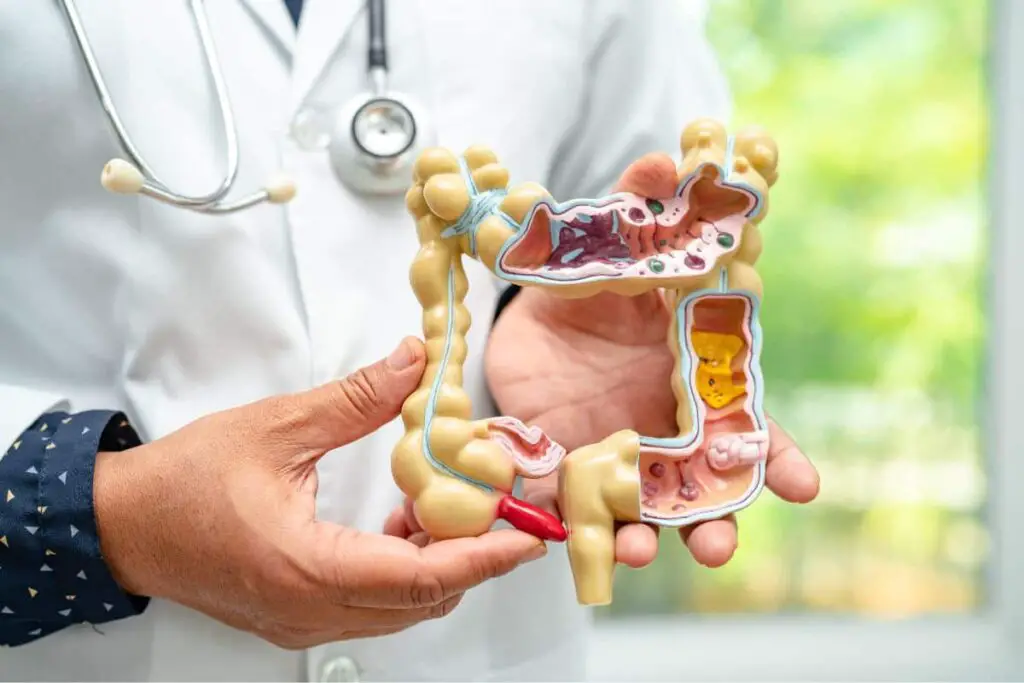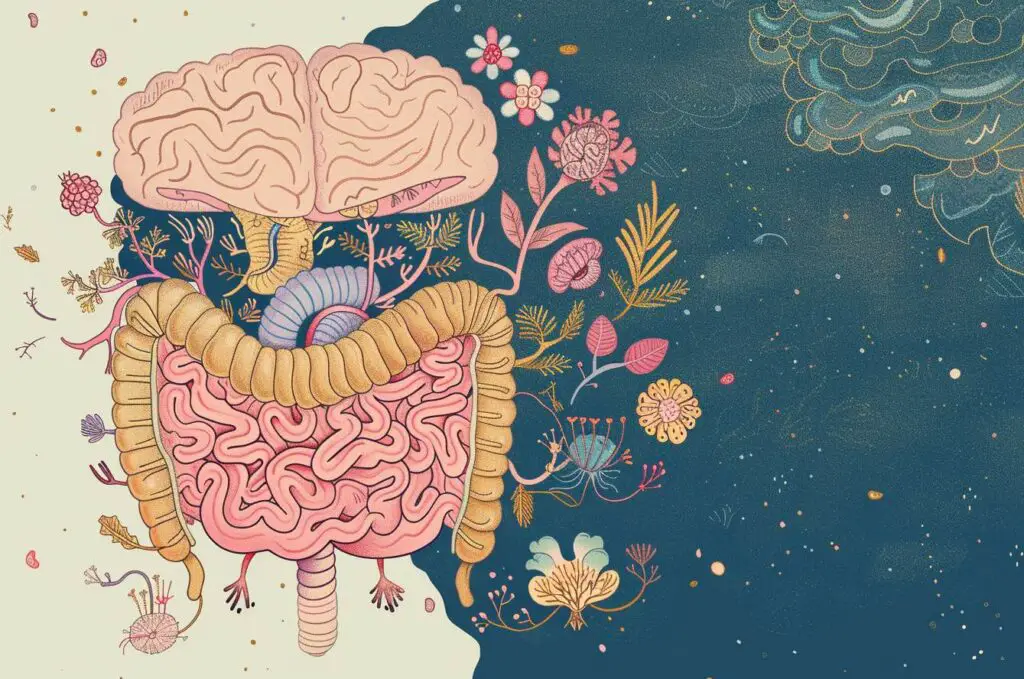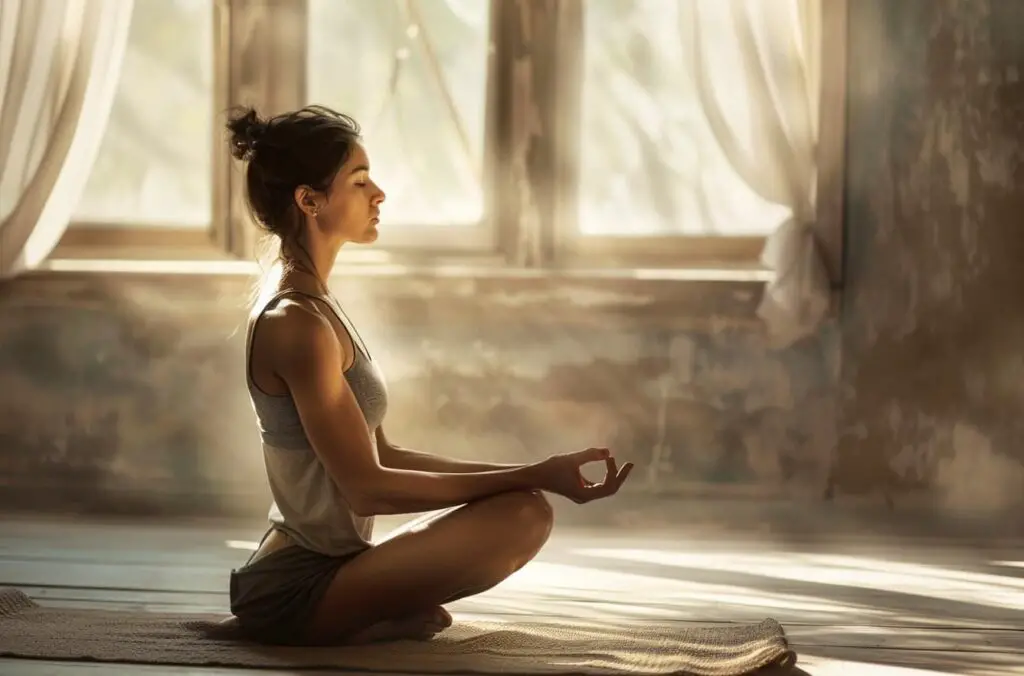Gut health is all about keeping your digestive system in tip-top shape; it’s a key player in your overall well-being. Think of it as the ultimate multitasker, breaking down food, absorbing nutrients, and waving goodbye to waste. But the real star of the show is: the gut microbiome.
This bustling community of trillions of microorganisms – from bacteria to viruses and fungi – is like your body’s personal cheerleading squad, keeping your gut running smoothly.
This guide is perfect for anyone curious about their gut’s role in their health. We’ll explore the gut-brain connection, how to recognize red flags for an unhealthy gut, and lifestyle changes that can improve your gut health. We’ll even debunk some common gut health myths and offer advice on when to seek professional help.
So, if you’re ready to start feeling your best, it’s time to give your gut the love and attention it deserves. Let’s dive in and unlock the secrets of gut health together.

Key Takeaways on Gut Health:
- Gut Health Basics: Gut health is crucial for efficient digestion, nutrient absorption, and overall well-being.
- Gut-Brain Connection: Your gut and brain are in constant communication, influencing your mental well-being.
- Signs of an Unhealthy Gut: Recognize red flags like digestive issues, autoimmune problems, skin rashes, and fatigue.
- Diet’s Role in Gut Health: Probiotic and prebiotic foods, high in fiber and nutrients, support a healthy gut microbiome. Avoid highly processed foods, excessive alcohol, and artificial sweeteners that can disrupt gut balance.
- Lifestyle Changes for a Healthier Gut: Stress management, quality sleep, and regular exercise are as important as diet for gut health.
- Probiotics and Prebiotics: Probiotics are live bacteria that support gut health, while prebiotics act as food for these beneficial bacteria.
- Debunking Common Myths: Detoxes, probiotic supplements, antibiotics, and trendy “superfoods” are not the be-all and end-all for gut health. A balanced, diverse diet and healthy lifestyle are key.
1. What is Gut Health and Why Does It Matter?
Gut health refers to the balance and function of the gastrointestinal tract, which includes the gut microbiome, a community of trillions of microbes. This balance is crucial for efficient digestion, nutrient absorption, and overall well-being.
The gut isn’t just a food processor; it plays a vital role in our immune system, mental health, and even the prevention of diseases like gastrointestinal and endocrine disorders, as well as cardiovascular diseases.
The gut microbiota, or the collection of microorganisms in our digestive system, is like a bustling city of bacteria, viruses, and fungi. These microorganisms help break down food, produce vitamins, and communicate with our body’s cells.
When the gut microbiome is out of whack, it can lead to a cascade of health issues. For example, poor gut health has been linked to a weakened immune system, anxiety, and even gastrointestinal conditions like irritable bowel syndrome (IBS).
Imagine your gut as a garden: when it’s well-tended with a diverse range of “good” bacteria, it flourishes, and so does your health. But if the balance is upset, it’s like introducing invasive weeds that can wreak havoc on the entire system.
Gut health is the cornerstone of overall health. By nourishing your gut with a balanced diet, managing stress, and avoiding unnecessary antibiotics, you’re not just keeping your digestive system happy, but you’re also fortifying your body’s first line of defense against a whole host of health issues.
2. The Gut-Brain Connection: How Your Gut Influences Your Mental Health

Did you know that your gut and brain are in constant communication? This intricate relationship, often referred to as the gut-brain axis, has a significant impact on your mental well-being.
Your gut is lined with millions of neurons that are in direct communication with your brain via the vagus nerve. This bidirectional pathway allows your gut to influence your brain and vice versa.
Neurotransmitters, such as serotonin and dopamine, crucial for regulating mood, are primarily produced in the gut. In fact, about 95% of the body’s serotonin is found in the gut. This is why gut health can directly impact your emotional state.
Research in the field of neuroscience has shown that an imbalance in gut bacteria, known as dysbiosis, is linked to conditions like anxiety and major depressive disorder. On the flip side, a healthy gut flora can support cognitive abilities and mental well-being.
So, what can you do to support mental well-being through your gut? Here are some lifestyle and dietary factors to consider:
- Eat a diverse range of plant-based foods to promote a healthy gut microbiome.
- Include fermented foods like yogurt, kefir, and kimchi for beneficial probiotics.
- Manage stress through practices like meditation and yoga, as stress can negatively impact gut health.
- Get regular exercise, which has been shown to support both gut and brain health.
Your gut is often called your “second brain” for a reason. By nourishing your gut with the right foods and lifestyle choices, you’re not just supporting your digestive health, but also your mental well-being.
3. Signs of an Unhealthy Gut: Recognizing the Red Flags

Your gut is a good communicator, and when it’s not happy, it lets you know. Here are some signs that your gut might be in need of some TLC:
- Digestive Issues: If you’re experiencing frequent bloating, gas, or diarrhea, it could be a sign that your gut isn’t functioning at its best. These symptoms may also be associated with IBS.
- Bloating and Constipation: Feeling bloated or struggling with constipation are red flags for an unhappy gut. In a healthy gut, you should experience regular digestion and the absence of digestive discomfort.
- Autoimmune Problems: Believe it or not, your gut health can influence your immune system. If you have unexplained autoimmune problems, such as rheumatoid arthritis or lupus, your gut might be a contributing factor.
- Skin Rashes: Skin issues like eczema or rosacea can be linked to inflammation in the gut.
- Sugar Cravings: An unhealthy gut can make you crave sugary foods due to imbalances in gut bacteria.
- Fatigue: If you’re constantly feeling tired even when you’re getting enough sleep, it could be due to an unhealthy gut. Stable energy levels are a good indicator of gut health.
The good news is that you can improve your gut health by making some simple lifestyle changes we’ll cover below. If you’re experiencing persistent gut issues, it’s always a good idea to consult with a healthcare professional to rule out any serious conditions.
4. The Role of Diet in Gut Health: What to Eat and What to Avoid
Your gut is like a garden, and the food you eat is the fertilizer. To keep your gut flourishing, consider adding these “probiotic” and “prebiotic” foods to your diet:
- Probiotic Foods: These are rich in good bacteria, which can help balance the microbiome. Think yogurt, kefir, kimchi, and sauerkraut.
- Prebiotic Foods: These act as food for the good bacteria, helping them thrive. Foods like garlic, onions, leeks, and bananas are rich in prebiotics.
- High-Fiber Foods: Fiber acts as a broom, sweeping out waste and promoting regular bowel movements. Aim for whole grains, legumes, fruits, and vegetables.
On the flip side, here are some foods that can throw your gut off-balance:
- Worst Foods for Gut Health: Highly processed foods, sugary treats, and excessive alcohol can feed the wrong kind of bacteria and lead to inflammation.
- Artificial Sweeteners: These can disrupt the balance of gut bacteria, so it’s best to consume them in moderation.
- Fatty Foods: While healthy fats are important, excessive consumption of saturated and trans fats can be harmful to the gut lining.
It’s not just about what you eat but also how you eat. Chewing your food thoroughly, eating at regular intervals, and staying hydrated all play a role in maintaining gut health.
5. Beyond Diet: Lifestyle Changes for a Healthier Gut
Your gut health is also influenced by your lifestyle. Stress, sleep, and exercise play vital roles in gut function. Here are some practical tips to incorporate gut-friendly habits into your daily routine:
- Stress Management and Mindfulness: Chronic stress can disrupt the balance of your gut microbiome. Try incorporating stress-reducing practices like meditation, yoga, or deep breathing exercises into your daily routine.
- Quality Sleep: Aim for 7-8 hours of quality sleep each night. Poor sleep can lead to imbalances in gut bacteria and increase inflammation in the body.
- Regular Exercise: Physical activity can have a positive impact on your gut microbiome. Aim for at least 30 minutes of moderate exercise most days of the week.
- Dietary Changes: Focus on high-fiber foods like fruits, vegetables, and whole grains. Limit processed and sugary foods, as they can negatively impact gut health.
- Lifestyle Adjustments: In addition to exercise, find ways to incorporate movement into your day, such as taking short walks or using a standing desk.
By making these lifestyle changes, you can improve your gut health naturally, in addition to supporting your overall well-being. So, don’t just think about what’s on your plate; consider how you’re managing stress, prioritizing sleep, and fitting in physical activity. Your gut will thank you for it!

6. Probiotics and Prebiotics: Understanding the Basics
What are Probiotics and Prebiotics?
- Probiotics are live bacteria and yeasts that are good for your digestive system. Some common types include Bifidobacterium and Lactobacillus.
- Prebiotics are a type of fiber that acts as food for probiotics, helping them to thrive and multiply in your gut.
Why are Probiotics and Prebiotics Important?
- Probiotics help maintain a healthy balance of good bacteria in your gut, which is essential for proper digestion and overall health.
- Prebiotics provide the nourishment that probiotics need to do their job effectively, supporting a healthy gut microbiome.
How to Include Probiotics and Prebiotics in Your Diet:
- Probiotics: Look for fermented foods like yogurt, kimchi, sauerkraut, and kefir. You can also take probiotic supplements, but it’s best to consult with a healthcare professional first.
- Prebiotics: Foods rich in prebiotic fiber include garlic, onions, leeks, asparagus, bananas, and whole grains.
The Benefits of Probiotics and Prebiotics:
- Improved Digestive Health: Probiotics can help with issues like diarrhea, irritable bowel syndrome, and inflammatory bowel disease.
- Enhanced Immune Function: A healthy gut microbiome, supported by probiotics and prebiotics, can boost your immune system.
- Synbiotics: Some products contain both probiotics and prebiotics, known as synbiotics, to maximize their combined benefits.
Incorporating probiotics and prebiotics into your diet can be as simple as enjoying a cup of yogurt with sliced bananas or adding sauerkraut to your sandwich. These small dietary changes can have a big impact on your gut health and overall well-being.
7. Common Myths About Gut Health Debunked

Myths about gut health are as common as they are varied. It’s time to set the record straight on a couple of them.
- Detoxes: There’s this idea that you need to go on a detox to “cleanse” your gut. Here’s the truth: your liver and kidneys already do a stellar job of detoxifying your body. What your gut needs is a balanced diet high in fiber and low in processed foods, not a trendy detox.
- Probiotic Supplements: While probiotics can be beneficial for some, they’re not a one-size-fits-all solution. Research suggests that the best way to support your gut microbiome is through a diverse diet rich in prebiotic and probiotic foods like yogurt, kefir, and sauerkraut.
- Antibiotics: There’s a common belief that antibiotics are always bad for your gut. While they can disrupt your microbiome, they are sometimes necessary to treat bacterial infections. If you’re prescribed antibiotics, consider supplementing with a probiotic to help restore balance.
- Gut Health Foods: It’s easy to get caught up in the latest “superfoods” for gut health, like kimchi or kombucha. While these can be beneficial, a varied diet with plenty of fruits, vegetables, whole grains, and lean proteins is the real key to gut health.
In a nutshell, when it comes to gut health, there’s no magic bullet or one-size-fits-all solution. It’s about balance, diversity, and a healthy lifestyle. So, say goodbye to the myths and hello to a well-nourished gut.
8. When to Seek Professional Help: Recognizing Serious Gut Health Issues
While minor digestive discomforts can often be managed with lifestyle changes, there are times when it’s crucial to seek the expertise of a healthcare professional.
A Gastroenterologist, a doctor who specializes in digestive health, can play a vital role in diagnosing and managing more serious gut conditions.
Here are some signs that indicate you should consult a professional:
- Persistent or severe abdominal pain
- Unexplained weight loss
- Blood in stool or black, tarry stools
- Frequent or prolonged diarrhea
- Difficulty swallowing
- Recurrent heartburn or acid reflux
These symptoms could be indicative of conditions such as Inflammatory Bowel Disease (IBD), including Crohn’s disease and Ulcerative Colitis, as well as other serious gut disorders. Early diagnosis and intervention by a Gastroenterologist can significantly improve outcomes for these conditions.
If you’re experiencing any of these symptoms, don’t delay seeking medical advice. Your primary care physician can refer you to a Gastroenterologist who can conduct the necessary tests and tailor a treatment plan to your specific needs.
Remember, your gut health is a critical component of your overall well-being. Don’t hesitate to reach out to a professional if you have concerns about your digestive health. It’s always better to be proactive and catch potential issues early.
Gut Health FAQs
1. What exactly is gut health?
Gut health is all about the balance of bacteria in your digestive system. These microorganisms help your body function properly. This balance is crucial for your overall health, impacting your immune system and mental well-being. When your gut is healthy, you feel good overall. Maintain a balanced gut for a healthy personal ecosystem.
2. How can I improve my gut health naturally?
To improve your gut health naturally, diversify your diet with fruits, vegetables, whole grains, and fermented foods to nourish beneficial bacteria. Reduce stress through relaxation techniques, stay hydrated, and ensure 7-8 hours of quality sleep nightly.
Limit antibiotics to when necessary, and consult your doctor about probiotics, especially after antibiotics. Exercise regularly, avoid smoking and excessive alcohol, minimize processed foods and added sugars, and listen to your body to adjust your diet and lifestyle for optimal gut health.
3. What are 3 signs of a healthy gut?
Three signs you have a healthy gut are:
1. You go to the bathroom regularly without any trouble, which means your gut is working well.
2. You hardly get sick because a strong immune system is often linked to a healthy gut.
3. You don’t feel gassy or uncomfortable after eating, showing your body is good at handling the food you eat.
4. What are symptoms of an unhealthy gut?
Common signs and symptoms of an unhealthy gut include frequent stomach disturbances, unexplained weight changes, skin irritation, and food intolerances. If you’re experiencing these symptoms, it’s best to consult a healthcare professional.
5. How do probiotics and prebiotics contribute to gut health?
Probiotics are live bacteria and yeasts that are good for your health, especially your digestive system. They help maintain a healthy balance of gut bacteria. Prebiotics, on the other hand, are a type of fiber that the human body cannot digest. They serve as food for probiotics, promoting their growth and activity in the gut. Together, probiotics and prebiotics work in harmony to support a healthy gut environment.
6. What are the best foods for gut health?
Foods rich in fiber, like fruits, vegetables, and whole grains, are great for your gut. Fermented foods like yogurt and kimchi are also good, as they contain probiotics that promote a healthy gut microbiome.
7. What are the worst foods for gut health?
Highly processed foods, sugary treats, and excessive alcohol can harm your gut. These foods can disrupt the balance of good and bad bacteria in your gut, leading to inflammation and other digestive issues.
8. Can gut health affect weight?
Research suggests that the composition of your gut microbiome may impact your weight. A diverse gut microbiome, achieved through a balanced diet and healthy lifestyle, can support weight management.
9. How long does it take to improve gut health?
It varies from person to person, but you may start to see improvements in your gut health within a few weeks of making positive changes to your diet and lifestyle.
10. Are there any gut health tests available?
Yes, there are tests like stool analysis and breath tests that can provide insights into your gut microbiome and digestive function. These tests can be helpful in identifying specific issues and guiding personalized treatment plans.
11. Can antibiotics affect gut health?
Antibiotics can disrupt the balance of bacteria in your gut, leading to digestive issues like diarrhea. It’s important to use antibiotics only when necessary and to talk to your doctor about strategies to support your gut health during and after antibiotic treatment.
Final Thoughts on Gut Health
In the intricate web of health and well-being, the gut plays a starring role. From efficient digestion to mental well-being, the gut’s microbiome full of microorganisms that influence our entire body.
This comprehensive guide has demystified gut health, from its basics to the gut-brain connection, dietary and lifestyle factors, and when to seek professional help.
By nourishing your gut with a balanced diet, managing stress, and incorporating healthy lifestyle habits, you’re not just supporting your digestive system; you’re nurturing a cornerstone of your overall health. So, bid adieu to the myths and embrace a well-nourished gut.
With a few simple lifestyle changes, you can unlock the secrets of gut health and set yourself on a path to long-term wellness. After all, a healthy gut is the foundation of a healthy you.
- https://www.ncbi.nlm.nih.gov/pmc/articles/PMC9504309/
- https://www.ncbi.nlm.nih.gov/pmc/articles/PMC3272651/
- https://www.health.harvard.edu/diseases-and-conditions/the-gut-brain-connection
- https://www.ncbi.nlm.nih.gov/pmc/articles/PMC5641835/
- https://www.ncbi.nlm.nih.gov/pmc/articles/PMC5847071/
- https://www.canr.msu.edu/news/probiotics-prebiotics-foods
- https://www.webmd.com/diet/foods-high-in-prebiotic

